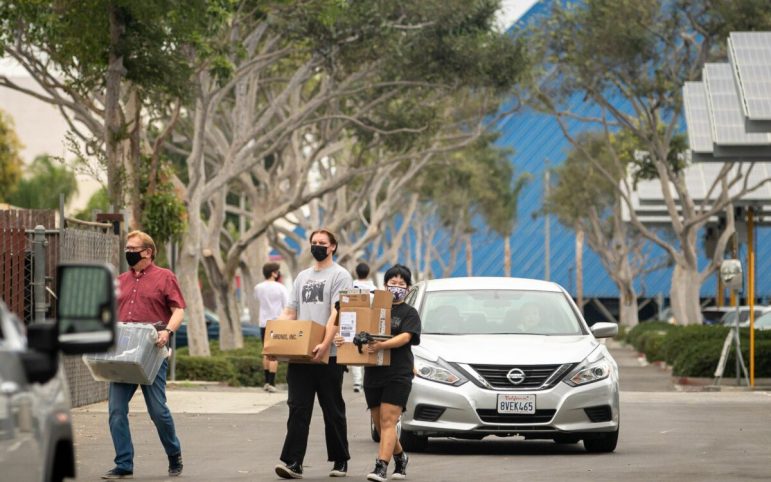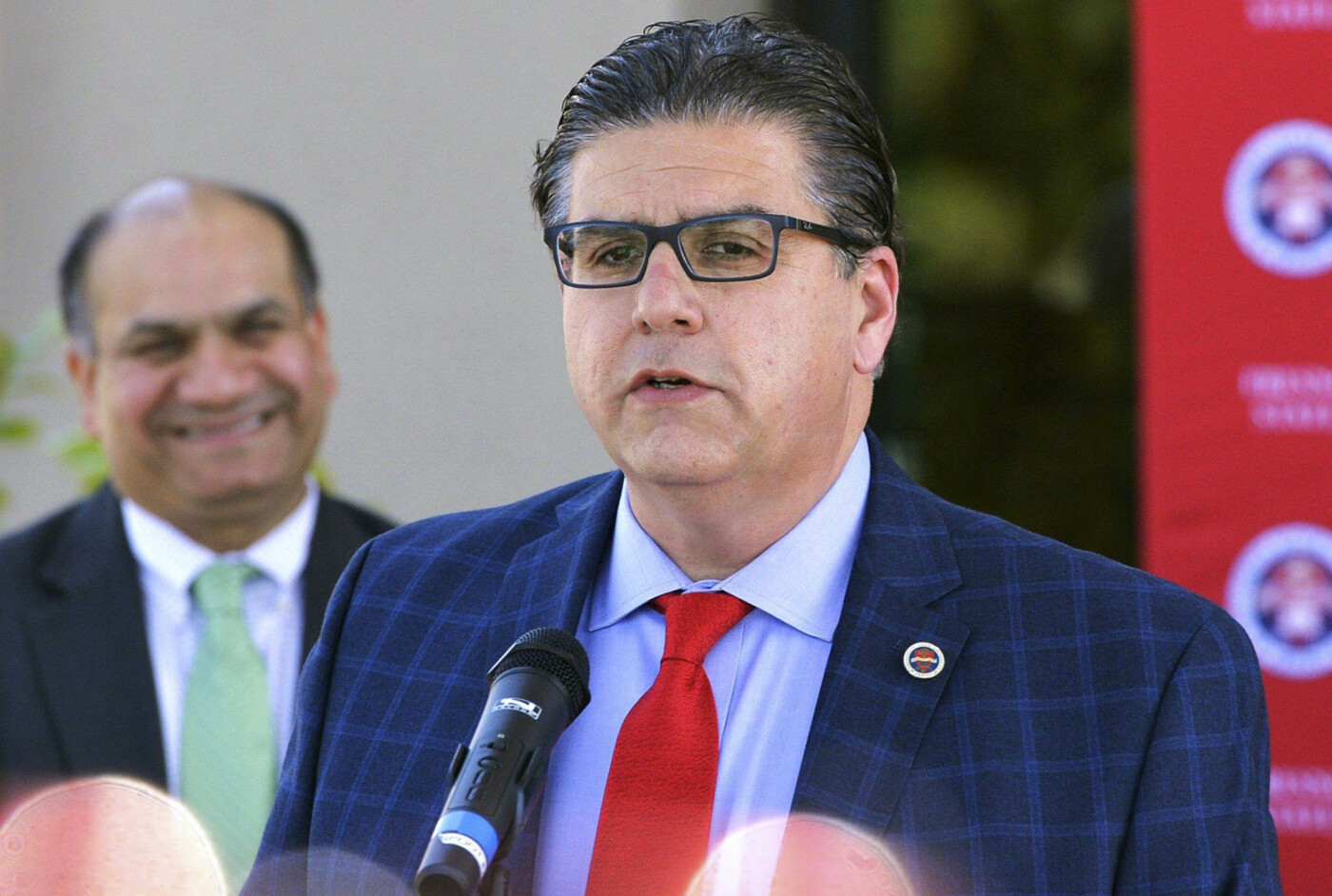In a stunning fall from grace, California State University Chancellor Joseph Castro has resigned from his post, effective immediately, over accusations that he mishandled sexual assault and workplace initimidation claims against a former colleague while president of Fresno State University.
Castro — who just completed his first year as the first Mexican American chancellor of the nation’s largest four-year public university system — submitted his resignation to the Cal State Board of Trustees this evening. The system’s governing body had met behind closed doors the entire day, debating his fate.
“The decision to resign is the most difficult of my professional life,” Castro said in a written statement Thursday evening. “While I disagree with many aspects of recent media reports and the ensuing commentary, it has become clear to me that resigning at this time is necessary so that the CSU can maintain its focus squarely on its educational mission and the impactful work yet to be done.”
The fallout stems from a February bombshell exposé by USA TODAY reporting that Castro was personally aware of at least seven complaints against Frank Lamas, the head of campus student affairs at Fresno State. The complaints against Lamas, at least 12 in all, detailed a pattern in which the senior administrator “stared at women’s breasts, touched women inappropriately, made sexist remarks, and berated, belittled, and retaliated against employees,” USA TODAY reported. Those complaints began soon after Lamas was hired and spanned the six years he was on the job.
Despite knowledge of the allegations, Castro still recommended Lamas for an achievement award and later — rather than firing or calling for his resignation — paid him $260,000 and full retirement benefits to leave his post.
The settlement forbade Lamas from ever working again at the Cal State system, but promised him a letter of recommendation if he wanted to work at a different college.
Three weeks after the settlement, the Cal State Board of Trustees formally hired Castro as the 23-campus system’s next chancellor. He formally became chancellor in January 2021.
USA TODAY also reported that Castro said he conferred with then-chancellor Timothy White on how to proceed with Lamas. The report said both Castro and White agreed paying Lamas off was easier than enduring a potentially expensive legal fight with him.
Lamas “denied all allegations of wrongdoing,” he told USA TODAY.
Executive Vice Chancellor and Chief Financial Officer Steve Relyea will take over as acting chancellor until an interim chancellor has been named.
‘It caused additional pain’
The drumbeat for Castro’s ousting has intensified since USA Today published its report Feb. 3. The next day, state Sen. Connie Leyva, a Chino Democrat who heads the Senate’s education committee, called for an outside investigation against Castro and said that he should immediately resign if the allegations against him were true. Later that day, her counterpart in the Assembly, Riverside Democrat Jose Medina, also called for an investigation but stopped short of demanding Castro’s dismissal.
That same day Castro and Lillian Kimbell, who heads the Cal State board of trustees, both said that they welcomed an independent investigation into how Castro handled the assault charges against Lamas. Castro partially defended his actions at Fresno State: “While I followed CSU policy and took the steps to ensure this individual could never work on a CSU campus, I recognize that certain aspects of the process should have been handled better.”
Castro further explained his rationale for offering Lamas a letter of recommendation in an “open letter” he shared with Cal State students and staff that night. “In hindsight, while my motives were to expedite Dr. Lamas’ permanent removal from the CSU, I regret agreeing to this aspect of the settlement, knowing that it caused additional pain,” Castro wrote.
At least one campus sexual assault proceedings expert said Castro was wrong to say his hands were tied from taking action against Lamas earlier. Castro’s core defense is that because no employee filed a complaint against Lamas, the university couldn’t act on the accusations: It wasn’t until campus investigators had credible evidence supporting one accuser that Castro could proceed to remove Lamas from his job.
“It’s perfectly possible for schools to investigate allegations of harassment while treating everyone fairly,” Alexandra Brodsky, a civil-rights activist turned lawyer, wrote in an email to The Chronicle of Higher Education. She added that “schools can initiate their own investigations” independent of one started by someone filing a complaint.
Consternation continued to flow. Students had gathered protesting Castro’s handling of the sexual assault claims. The Visalia Times-Delta posted an editorial urging the university’s board to fire Castro. The systemwide academic faculty union sought an independent investigation, calling the USA Today report “disturbing.”. The faculty senate at Fresno State also expressed dismay over Castro’s time at Fresno through a vote of no-confidence.
Resistance spread to other campuses. By earlier this week, for instance, some 200 faculty and staff at Long Beach State had signed a petition demanding Castro’s resignation, effective immediately. “A system that touts diversity, equity, and inclusion as central values,” they argued, “cannot claim to pursue those values with Castro in place.”
At the upcoming March meeting, the Board of Trustees plans to vote to bring on an outside group that will conduct a systemwide assessment. The goal is to gain “insights, recommendations and resources to help advance CSU’s Title IX and civil rights training, awareness, prevention, intervention, compliance, accountability, and support systems,” a Cal State statement read. This assessment will begin this March at Fresno State University.

Raised by a single mother in the San Joaquin Valley town of Hanford, Castro once told CalMatters that the place was “core to my being.”
“My family immigrated here 100 years ago. My great grandfather helped to build the railroad through the valley. My grandfather was a dreamer of his time. And they lived in tents along the railroad and began their lives in tents in my hometown. So my thinking has been shaped about, you know, giving opportunities to talented people who normally wouldn’t be given those opportunities — including people like me,” he said.
He was a graduate of UC Berkeley and later Stanford University, where he received a doctorate in higher-education and leadership. In 2013 he became president of Fresno State, a valley campus which gained national recognition for graduating a high rate of low-income students.
